
Guide on How to Write a Reflection Paper with Free Tips and Example

A reflection paper is a very common type of paper among college students. Almost any subject you enroll in requires you to express your opinion on certain matters. In this article, we will explain how to write a reflection paper and provide examples and useful tips to make the essay writing process easier.
Reflection papers should have an academic tone yet be personal and subjective. In this paper, you should analyze and reflect upon how an experience, academic task, article, or lecture shaped your perception and thoughts on a subject.
Here is what you need to know about writing an effective critical reflection paper. Stick around until the end of our guide to get some useful writing tips from the writing team at EssayPro — a research paper writing service
What Is a Reflection Paper
A reflection paper is a type of paper that requires you to write your opinion on a topic, supporting it with your observations and personal experiences. As opposed to presenting your reader with the views of other academics and writers, in this essay, you get an opportunity to write your point of view—and the best part is that there is no wrong answer. It is YOUR opinion, and it is your job to express your thoughts in a manner that will be understandable and clear for all readers that will read your paper. The topic range is endless. Here are some examples: whether or not you think aliens exist, your favorite TV show, or your opinion on the outcome of WWII. You can write about pretty much anything.
There are three types of reflection paper; depending on which one you end up with, the tone you write with can be slightly different. The first type is the educational reflective paper. Here your job is to write feedback about a book, movie, or seminar you attended—in a manner that teaches the reader about it. The second is the professional paper. Usually, it is written by people who study or work in education or psychology. For example, it can be a reflection of someone’s behavior. And the last is the personal type, which explores your thoughts and feelings about an individual subject.
However, reflection paper writing will stop eventually with one very important final paper to write - your resume. This is where you will need to reflect on your entire life leading up to that moment. To learn how to list education on resume perfectly, follow the link on our dissertation writing services .
Unlock the potential of your thoughts with EssayPro . Order a reflection paper and explore a range of other academic services tailored to your needs. Dive deep into your experiences, analyze them with expert guidance, and turn your insights into an impactful reflection paper.

Free Reflection Paper Example
Now that we went over all of the essentials about a reflection paper and how to approach it, we would like to show you some examples that will definitely help you with getting started on your paper.
Reflection Paper Format
Reflection papers typically do not follow any specific format. Since it is your opinion, professors usually let you handle them in any comfortable way. It is best to write your thoughts freely, without guideline constraints. If a personal reflection paper was assigned to you, the format of your paper might depend on the criteria set by your professor. College reflection papers (also known as reflection essays) can typically range from about 400-800 words in length.
Here’s how we can suggest you format your reflection paper:

How to Start a Reflection Paper
The first thing to do when beginning to work on a reflection essay is to read your article thoroughly while taking notes. Whether you are reflecting on, for example, an activity, book/newspaper, or academic essay, you want to highlight key ideas and concepts.
You can start writing your reflection paper by summarizing the main concept of your notes to see if your essay includes all the information needed for your readers. It is helpful to add charts, diagrams, and lists to deliver your ideas to the audience in a better fashion.
After you have finished reading your article, it’s time to brainstorm. We’ve got a simple brainstorming technique for writing reflection papers. Just answer some of the basic questions below:
- How did the article affect you?
- How does this article catch the reader’s attention (or does it all)?
- Has the article changed your mind about something? If so, explain how.
- Has the article left you with any questions?
- Were there any unaddressed critical issues that didn’t appear in the article?
- Does the article relate to anything from your past reading experiences?
- Does the article agree with any of your past reading experiences?
Here are some reflection paper topic examples for you to keep in mind before preparing to write your own:
- How my views on rap music have changed over time
- My reflection and interpretation of Moby Dick by Herman Melville
- Why my theory about the size of the universe has changed over time
- How my observations for clinical psychological studies have developed in the last year
The result of your brainstorming should be a written outline of the contents of your future paper. Do not skip this step, as it will ensure that your essay will have a proper flow and appropriate organization.
Another good way to organize your ideas is to write them down in a 3-column chart or table.

Do you want your task look awesome?
If you would like your reflection paper to look professional, feel free to check out one of our articles on how to format MLA, APA or Chicago style
Writing a Reflection Paper Outline
Reflection paper should contain few key elements:
Introduction
Your introduction should specify what you’re reflecting upon. Make sure that your thesis informs your reader about your general position, or opinion, toward your subject.
- State what you are analyzing: a passage, a lecture, an academic article, an experience, etc...)
- Briefly summarize the work.
- Write a thesis statement stating how your subject has affected you.
One way you can start your thesis is to write:
Example: “After reading/experiencing (your chosen topic), I gained the knowledge of…”
Body Paragraphs
The body paragraphs should examine your ideas and experiences in context to your topic. Make sure each new body paragraph starts with a topic sentence.
Your reflection may include quotes and passages if you are writing about a book or an academic paper. They give your reader a point of reference to fully understand your feedback. Feel free to describe what you saw, what you heard, and how you felt.
Example: “I saw many people participating in our weight experiment. The atmosphere felt nervous yet inspiring. I was amazed by the excitement of the event.”
As with any conclusion, you should summarize what you’ve learned from the experience. Next, tell the reader how your newfound knowledge has affected your understanding of the subject in general. Finally, describe the feeling and overall lesson you had from the reading or experience.
There are a few good ways to conclude a reflection paper:
- Tie all the ideas from your body paragraphs together, and generalize the major insights you’ve experienced.
- Restate your thesis and summarize the content of your paper.
We have a separate blog post dedicated to writing a great conclusion. Be sure to check it out for an in-depth look at how to make a good final impression on your reader.
Need a hand? Get help from our writers. Edit, proofread or buy essay .
How to Write a Reflection Paper: Step-by-Step Guide
Step 1: create a main theme.
After you choose your topic, write a short summary about what you have learned about your experience with that topic. Then, let readers know how you feel about your case — and be honest. Chances are that your readers will likely be able to relate to your opinion or at least the way you form your perspective, which will help them better understand your reflection.
For example: After watching a TEDx episode on Wim Hof, I was able to reevaluate my preconceived notions about the negative effects of cold exposure.
Step 2: Brainstorm Ideas and Experiences You’ve Had Related to Your Topic
You can write down specific quotes, predispositions you have, things that influenced you, or anything memorable. Be personal and explain, in simple words, how you felt.
For example: • A lot of people think that even a small amount of carbohydrates will make people gain weight • A specific moment when I struggled with an excess weight where I avoided carbohydrates entirely • The consequences of my actions that gave rise to my research • The evidence and studies of nutritional science that claim carbohydrates alone are to blame for making people obese • My new experience with having a healthy diet with a well-balanced intake of nutrients • The influence of other people’s perceptions on the harm of carbohydrates, and the role their influence has had on me • New ideas I’ve created as a result of my shift in perspective
Step 3: Analyze How and Why These Ideas and Experiences Have Affected Your Interpretation of Your Theme
Pick an idea or experience you had from the last step, and analyze it further. Then, write your reasoning for agreeing or disagreeing with it.
For example, Idea: I was raised to think that carbohydrates make people gain weight.
Analysis: Most people think that if they eat any carbohydrates, such as bread, cereal, and sugar, they will gain weight. I believe in this misconception to such a great extent that I avoided carbohydrates entirely. As a result, my blood glucose levels were very low. I needed to do a lot of research to overcome my beliefs finally. Afterward, I adopted the philosophy of “everything in moderation” as a key to a healthy lifestyle.
For example: Idea: I was brought up to think that carbohydrates make people gain weight. Analysis: Most people think that if they eat any carbohydrates, such as bread, cereal, and sugar, they will gain weight. I believe in this misconception to such a great extent that I avoided carbohydrates entirely. As a result, my blood glucose levels were very low. I needed to do a lot of my own research to finally overcome my beliefs. After, I adopted the philosophy of “everything in moderation” as a key for having a healthy lifestyle.
Step 4: Make Connections Between Your Observations, Experiences, and Opinions
Try to connect your ideas and insights to form a cohesive picture for your theme. You can also try to recognize and break down your assumptions, which you may challenge in the future.
There are some subjects for reflection papers that are most commonly written about. They include:
- Book – Start by writing some information about the author’s biography and summarize the plot—without revealing the ending to keep your readers interested. Make sure to include the names of the characters, the main themes, and any issues mentioned in the book. Finally, express your thoughts and reflect on the book itself.
- Course – Including the course name and description is a good place to start. Then, you can write about the course flow, explain why you took this course, and tell readers what you learned from it. Since it is a reflection paper, express your opinion, supporting it with examples from the course.
- Project – The structure for a reflection paper about a project has identical guidelines to that of a course. One of the things you might want to add would be the pros and cons of the course. Also, mention some changes you might want to see, and evaluate how relevant the skills you acquired are to real life.
- Interview – First, introduce the person and briefly mention the discussion. Touch on the main points, controversies, and your opinion of that person.
Writing Tips
Everyone has their style of writing a reflective essay – and that's the beauty of it; you have plenty of leeway with this type of paper – but there are still a few tips everyone should incorporate.
Before you start your piece, read some examples of other papers; they will likely help you better understand what they are and how to approach yours. When picking your subject, try to write about something unusual and memorable — it is more likely to capture your readers' attention. Never write the whole essay at once. Space out the time slots when you work on your reflection paper to at least a day apart. This will allow your brain to generate new thoughts and reflections.
- Short and Sweet – Most reflection papers are between 250 and 750 words. Don't go off on tangents. Only include relevant information.
- Clear and Concise – Make your paper as clear and concise as possible. Use a strong thesis statement so your essay can follow it with the same strength.
- Maintain the Right Tone – Use a professional and academic tone—even though the writing is personal.
- Cite Your Sources – Try to cite authoritative sources and experts to back up your personal opinions.
- Proofreading – Not only should you proofread for spelling and grammatical errors, but you should proofread to focus on your organization as well. Answer the question presented in the introduction.
'If only someone could write my essay !' you may think. Ask for help our professional writers in case you need it.
Do You Need a Well-Written Reflection Paper?
Then send us your assignment requirements and we'll get it done in no time.
Related Articles
.webp)
20+ SAMPLE Reflective Essay in PDF | MS Word
Reflective essay | ms word, 20+ sample reflective essay, what is a reflective essay, 5 tips in writing a reflective essay, how to write a reflective essay, what is a reflective essay format, how do you start a reflective essay example, how do you write a reflective essay for university.
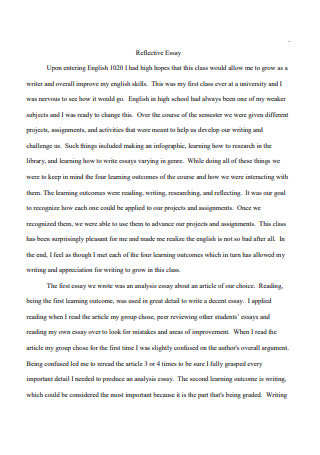
Reflective Essay Template
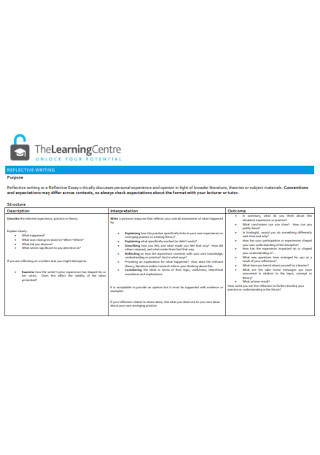
Reflective Writing
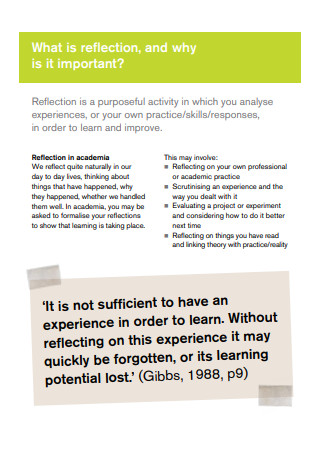
Short Guide Reflective Writing
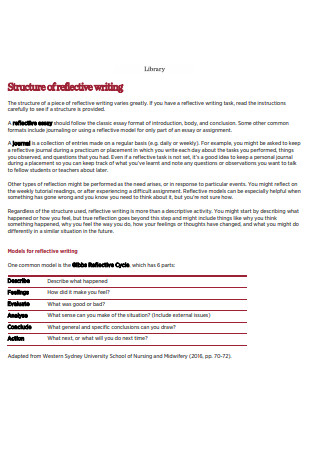
Reflective Writing Structure
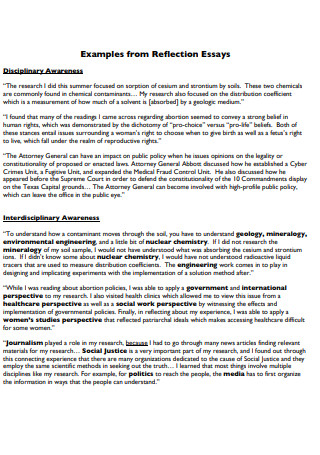
Reflection Essay Example
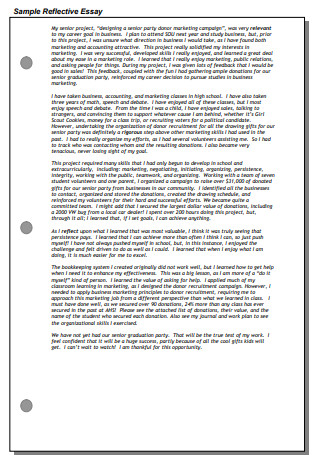
Sample Reflective Essay
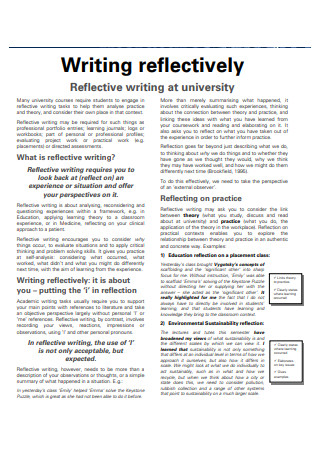
Reflective Writing at University
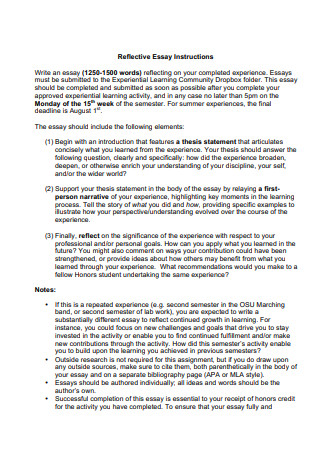
Reflective Essay Instructions
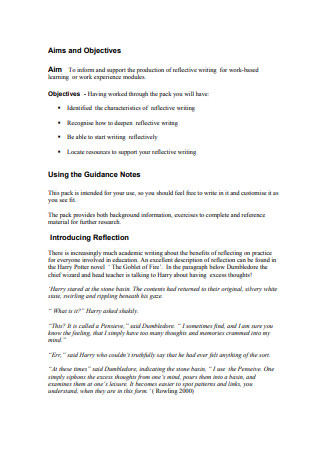
Reflective Writing – Guidance Notes for Students
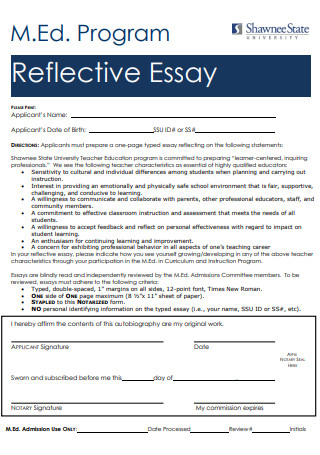
MEd Reflective Essay
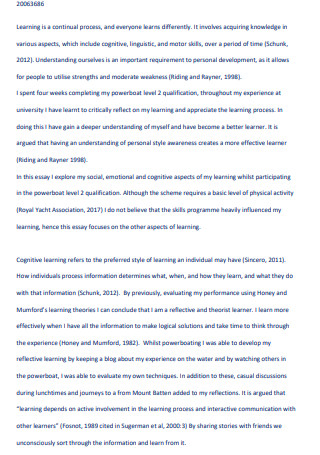
Basic Reflective Essay
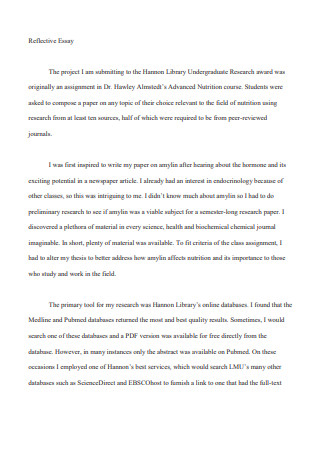
Reflective Essay in PDF
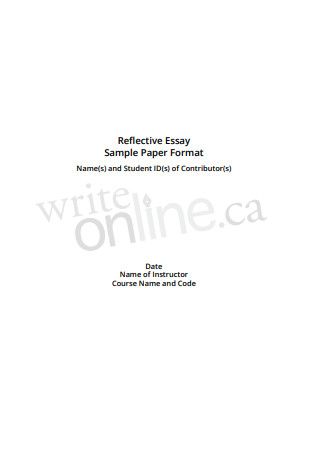
Reflective Essay Sample Paper Format
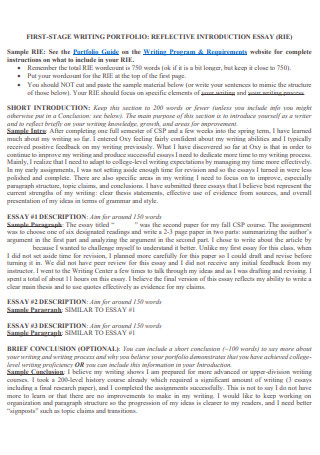
Sample Reflective Introduction Essay
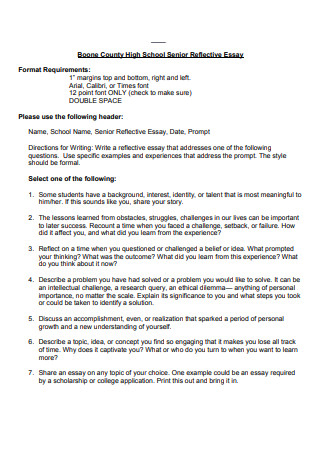
Senior Reflective Essay
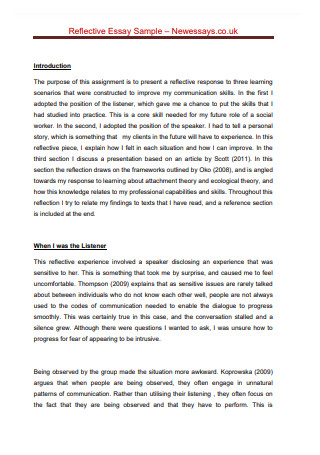
Reflective Essay Sample
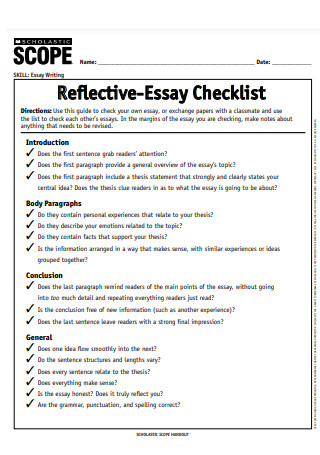
Reflective Essay Checklist
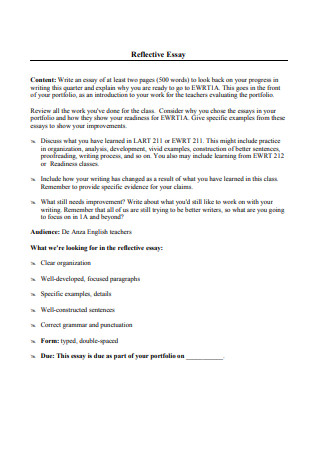
Reflective Essay Assignment
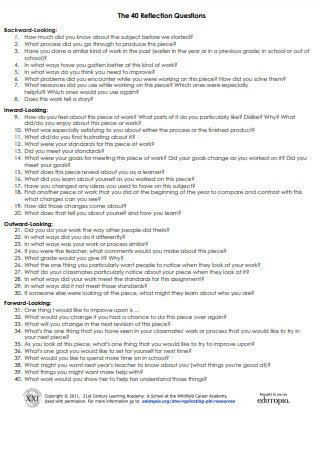
Sample Reflection Questions
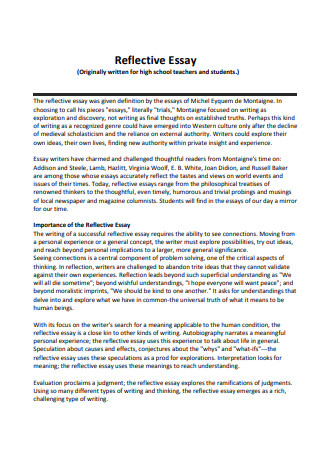
Reflective Essay High School
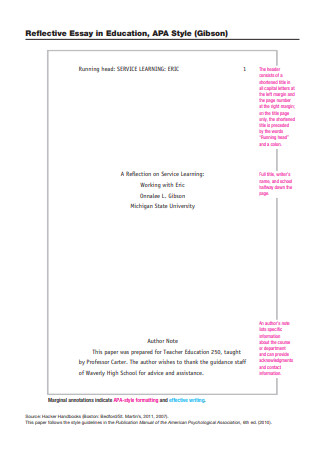
Reflective Essay in Education
Step 1: know your subject well, step 2: outline your essay, step 3: think critically , step 4: be creative but structured , share this post on your network, file formats, word templates, google docs templates, excel templates, powerpoint templates, google sheets templates, google slides templates, pdf templates, publisher templates, psd templates, indesign templates, illustrator templates, pages templates, keynote templates, numbers templates, outlook templates, you may also like these articles, 22+ sample argumentative essay in ms word | google docs | google slides | powerpoint | illustrator | pdf.

Studies show that practicing argumentative writing in middle school improves critical thinking skills, with 86% of students demonstrating enhanced analytical abilities compared to their peers without such practice. Another…
10+ SAMPLE Community College Essay in PDF | MS Word

George Bernard Shaw, a famous Irish playwright, once said, “I am of the opinion that my life belongs to the community, and as long as I live, it is…
browse by categories
- Questionnaire
- Description
- Reconciliation
- Certificate
- Spreadsheet
Information
- privacy policy
- Terms & Conditions

Reflection Paper

Writing a reflection paper is an excellent way to enhance your critical thinking skills and delve deeper into your learning experience. Whether you’re analyzing a book, reflecting on a specific element, or even exploring your own goals and objectives, a reflection paper offers a platform for self-expression and personal growth. In this article, we will define what a reflection paper is, provide a step-by-step guide on how to write one, answer frequently asked questions, and conclude with the importance and function of this unique form of writing.
1. Student Reflection Paper
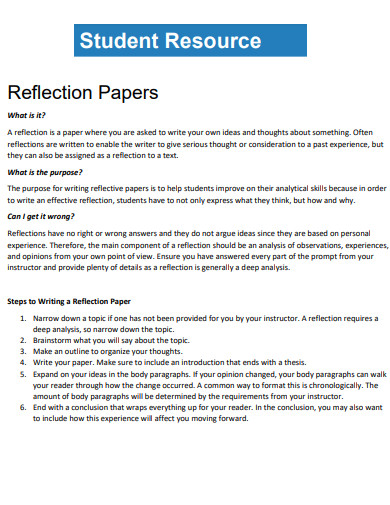
Size: 175 KB
2. Sample Reflection Paper
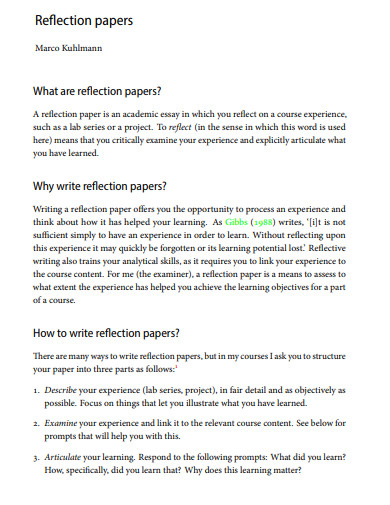
Size: 43 KB
3. College Reflection Paper
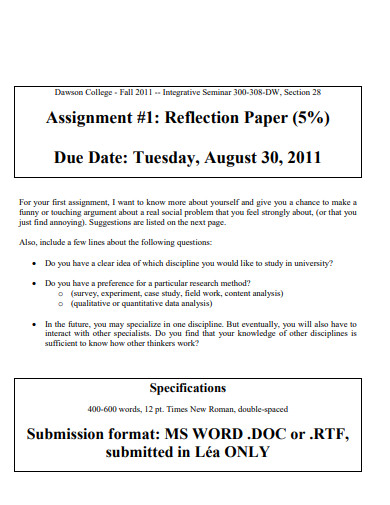
Size: 113 KB
4. Self Reflection Paper
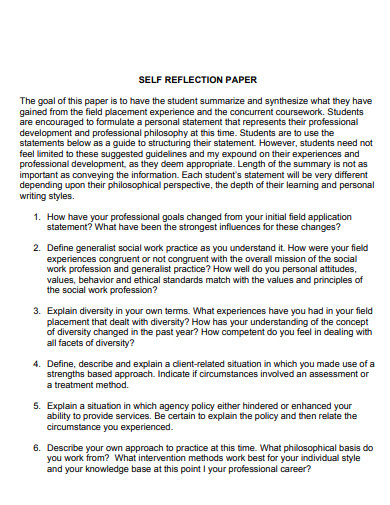
Size: 34 KB
5. High School Reflection Paper
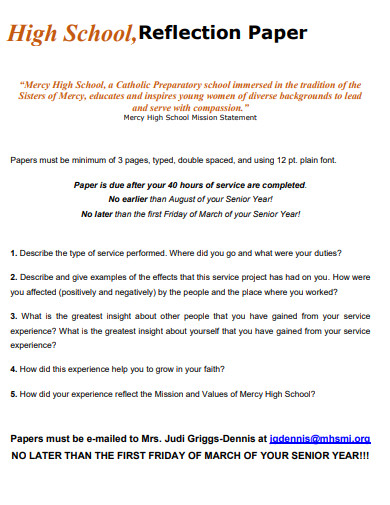
Size: 139 KB
6. Subject Reflection Paper
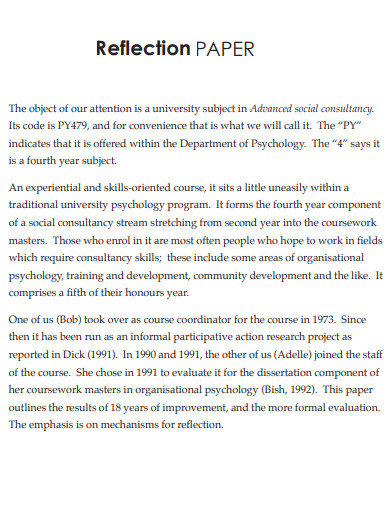
Size: 160 KB
7. Class Reflection Paper
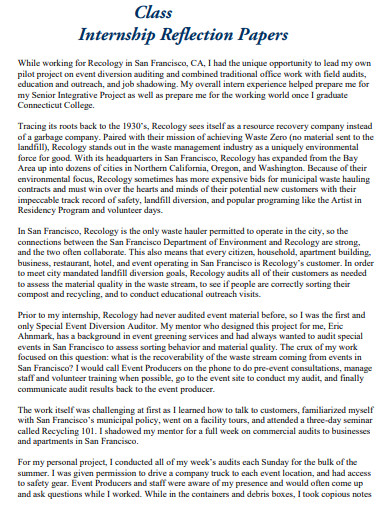
Size: 147 KB
8. APA Reflection Paper
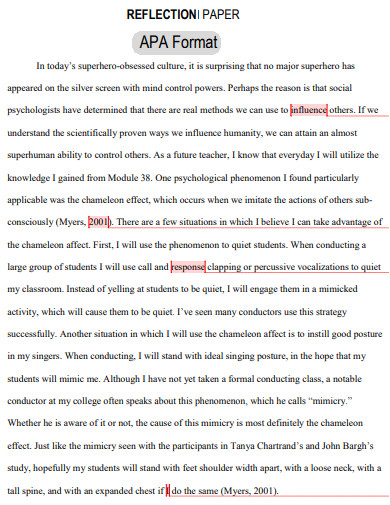
Size: 179 KB

9. Education Reflection Paper
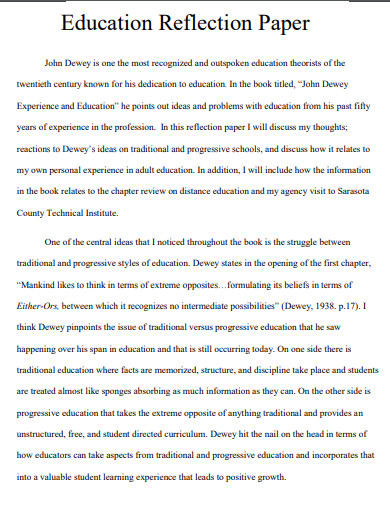
Size: 153 KB
10. English Reflection Paper
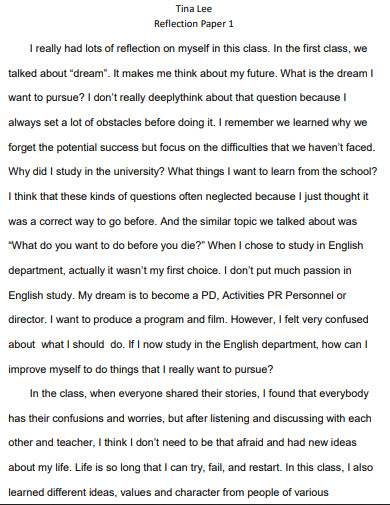
Size: 274 KB
11. Reflection Paper Essay
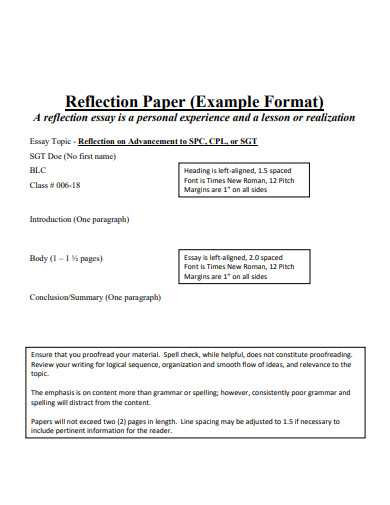
Size: 261 KB
12. Reflection Paper Teacher
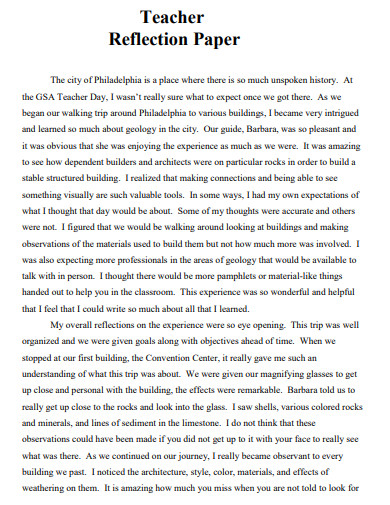
Size: 18 KB
13. Personal Reflection Paper
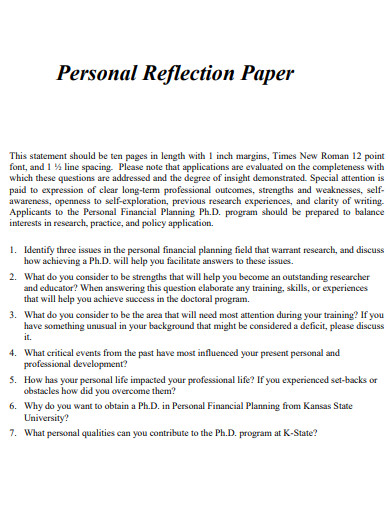
14. Reflection Paper Outline
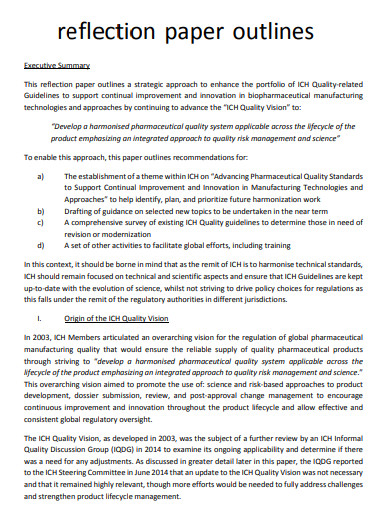
Size: 206 KB
15. Math Reflection Paper
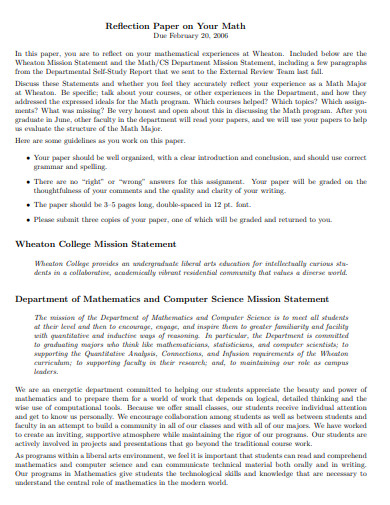
Size: 40 KB
16. Work Immersion Reflection Paper
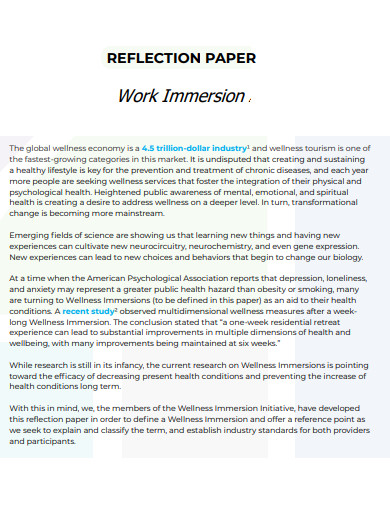
17. Reflection Paper Introduction
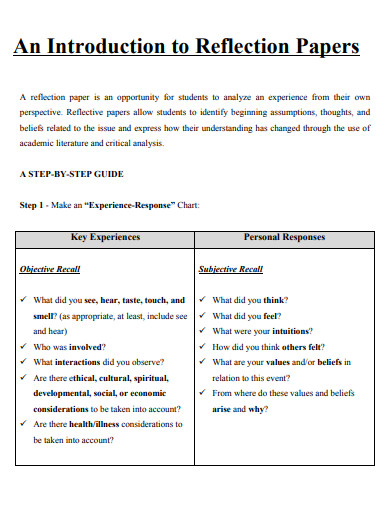
Size: 111 KB
18. Movie Reflection Paper
Size: 116 KB
19. Psychology Reflection Paper
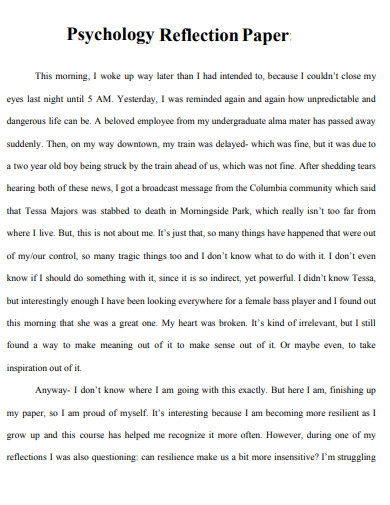
Size: 165 KB
20. Experience Reflection Paper
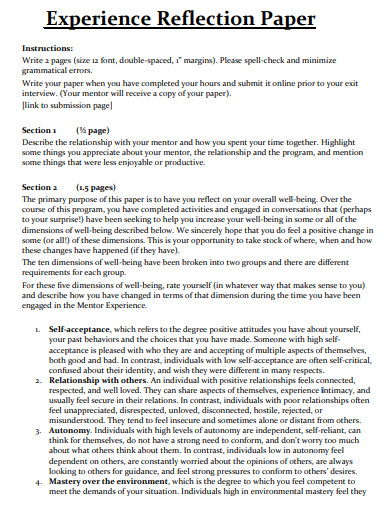
21. Internship Reflection Paper
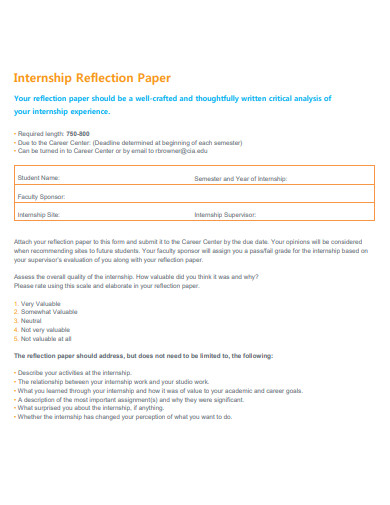
Size: 118 KB
22. Story Reflection Paper
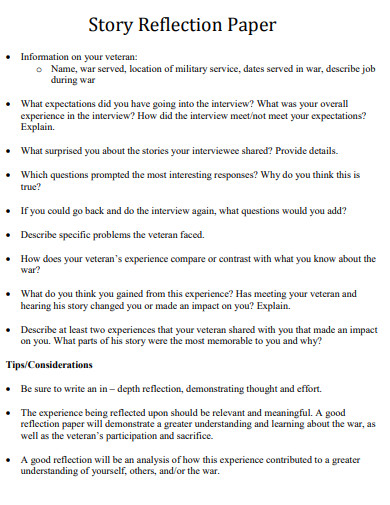
Size: 203 KB
23. Leadership Reflection Paper
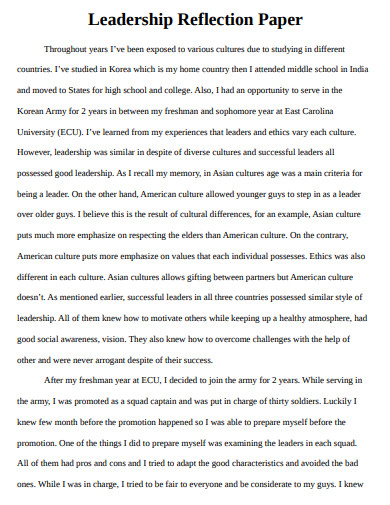
Size: 27 KB
24. Reflection Paper Project
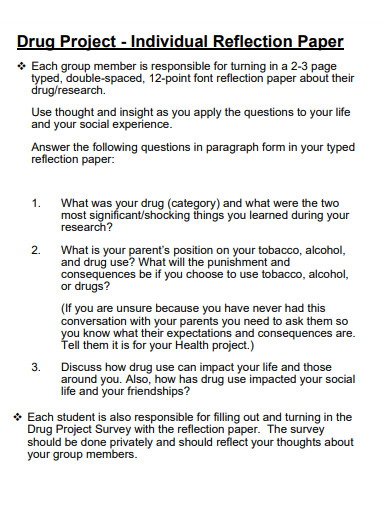
Size: 10 KB
25. Community Service Reflection Paper
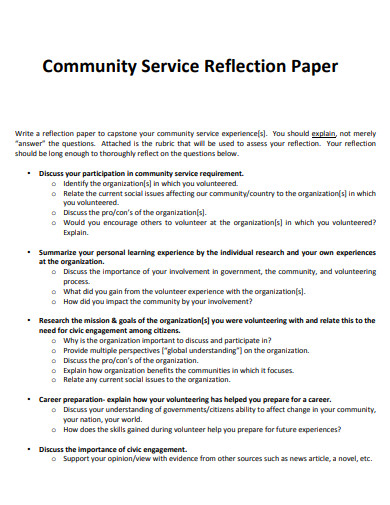
Size: 78 KB
26. Course Reflection Paper
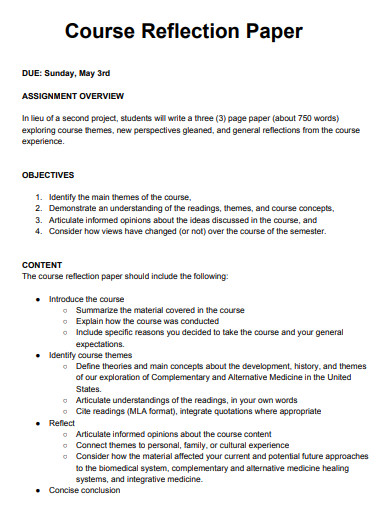
Size: 54 KB
27. science Reflection Paper
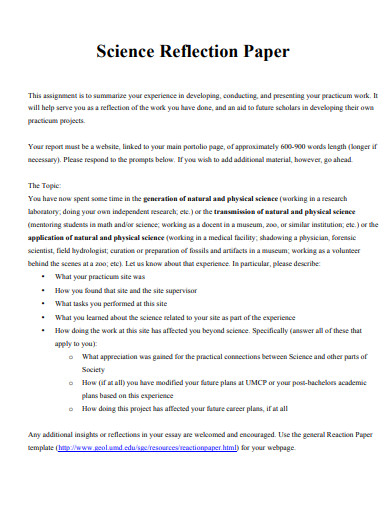
Size: 68 KB
28. Reflection Paper Example
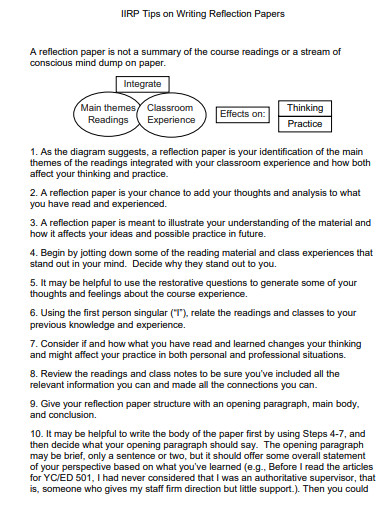
29. Reflection Paper Template
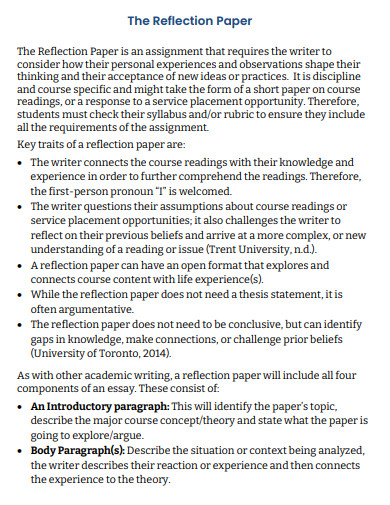
Size: 304 KB
30. Basic Reflection Paper
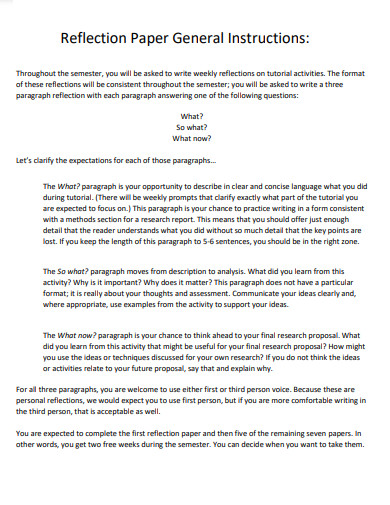
Size: 91 KB
What is a Reflection Paper?
A reflection paper is a written piece that allows you to share your thoughts, insights, and personal reactions about a particular subject, experience, or text. It goes beyond a simple summary by providing a deeper exploration of your own perceptions, emotions, and connections to the topic at hand. Reflection papers are often used in educational settings, such as college essays , to encourage critical thinking, self-awareness, and the development of analytical skills. They can focus on various aspects, including analyzing a book, discussing specific elements, or reflecting on personal goals and objectives .
How to Write a Reflection Paper
Writing a reflection paper can be an enriching and rewarding experience, allowing you to delve into your thoughts and emotions while developing critical thinking skills. However, if you’re new to the process, it can feel overwhelming. Fear not! In this step-by-step guide, we will walk you through the process of writing a reflection paper, providing you with a clear roadmap to follow. Whether you’re reflecting on a book, analyzing specific elements, or exploring personal goals and objectives, this guide will equip you with the tools and techniques to craft a thoughtful and engaging reflection paper. So, let’s embark on this journey of self-discovery and learn how to write a reflection paper format that captivates readers and unlocks new insights.
Step 1: Introduction
To begin your reflection paper, introduce the topic or experience you will be reflecting upon. Engage your readers by providing context, sharing relevant details, or posing thought-provoking questions. A compelling introduction sets the tone for the rest of your paper and captures the reader’s attention.
Step 2: Description and Analysis
In this section, describe the subject or experience you are reflecting upon. Use descriptive language to paint a vivid picture and provide necessary background information. Then, delve into the analysis by exploring your thoughts, feelings, and observations about the topic. Discuss how the experience or text has impacted you and why it stands out.
Step 3: Connection to Personal Experience or Knowledge
Make connections between the subject or experience and your personal life or existing knowledge. Relate the ideas or themes to your own experiences, beliefs, or values. This step demonstrates your ability to think critically and draw meaningful connections.
Step 4: Evaluation and Interpretation
Evaluate the subject or experience based on your own perspective. Offer your interpretations, opinions, and judgments, supported by evidence from the text or experience. Analyze the strengths and weaknesses, and consider any potential implications or broader significance.
Step 5: Conclusion
In your conclusion, summarize the key points of your reflection paper. Reflect on the overall impact of the subject or experience on your personal growth, learning, or development. Consider any new insights gained, questions raised, or future actions that might result from your reflection.
What is the importance of writing a reflection paper?
Writing a reflection paper encourages critical thinking, self-reflection, and a deeper understanding of a subject or experience. It allows you to examine your own thoughts, emotions, and connections, promoting personal growth and self-awareness. Reflection papers are widely used in educational settings to develop analytical skills and foster a deeper engagement with the material.
Do reflection papers follow a specific text structure?
Unlike traditional essays, reflection papers do not follow a rigid text structure . However, they generally include an introduction, description and analysis, connection to personal experience or knowledge, evaluation and interpretation, and a conclusion . This flexible structure allows for personal expression and creativity.
How important is punctuation in a reflection paper?
Punctuation plays a crucial role in maintaining clarity and coherence in your reflection paper. Proper punctuation enhances readability, helps convey your ideas effectively, and ensures that your thoughts flow smoothly. Take care to use appropriate punctuation marks, such as commas, periods, and quotation marks, to convey your intended meaning accurately.
In conclusion, reflection papers serve a vital function in developing critical thinking skills , self-awareness, and personal growth. They offer a platform for exploring various subjects, analyzing books or specific elements , and reflecting on personal goals and objectives. By engaging in the process of writing a reflection paper, you embark on a journey of self-discovery and deeper understanding. So, embrace this unique form of writing and uncover the valuable insights that lie within your reflections.

AI Generator
Text prompt
- Instructive
- Professional
10 Examples of Public speaking
20 Examples of Gas lighting
Academia.edu no longer supports Internet Explorer.
To browse Academia.edu and the wider internet faster and more securely, please take a few seconds to upgrade your browser .
Enter the email address you signed up with and we'll email you a reset link.
- We're Hiring!
- Help Center

Reflective Essay on Learning and Teaching

2019, International Journal of Arts and Social Science (IJASS)
Learning and teaching are inextricably intertwined. The principal objective of education is learning, and the means used to fulfil this aim is teaching. Considering that these two phenomena are inseparable, it can therefore be deduced that teaching has to be carried out for learning to take place. In light of the afore-mentioned, this reflective essay deals with some of my personal experiences in learning and teaching from my secondary years to my tertiary years and beyond. It is a reflection about my academic formation and how certain experiences and individuals in my life have shaped the way that I teach and whom I have become as a teacher. More importantly, this reflective essay highlights the transformative reflection that I experienced, during my postgraduate studies, in my attempts to become a better and more effective teacher. It is underscored that teachers have the responsibility to engage in continuous reflective practice as the principal means of improving and sustaining effective didactic practices. Effective teaching results in effective learning. Keywords: higher education, language(s), learning, learning and teaching, teaching.
Related Papers
Research in Pedagogy
Jelena Maksimović
Mustafa Shalaby , Ashwaq Naif Almuqati
Since the beginning of the 20th-century specialists have strived for ways that could comprise language teaching methods, which can ensure the best results in language training and teaching classes. And there are various methods, especially in the first half of this century. Some language teaching experts progressed further than methods with the hope of earning more results. Only some of teachers' encouraged towards what is known as reflective teaching (RT).The process of bridging the gap between experience and learning is called Reflection. RT teacher requires a good self-observations of self-assessment, the need to go on patrol in a way to ensure that teachers understand their classes so that they make their own classroom process improvements where needed. RT is the process by which teachers reflect on their classroom procedures for collecting and analysing the descriptive facts that will be modified to show where the change can be made. RT gives teachers material and professional flexibility for teachers. This paper elaborates on the process of reflection practice and deliberates the effects for foreign/second language educators.
Gregory J Light
Book Chapter
Abeer Althaqafi
To have a voice means to be reflexive and reflexivity is a social scientific variety of self-consciousness (Delamont, 1992). Reflection is important, and some might acknowledge that they do not really know how to get the best from it. According to Ghaye (2011), reflective practices help us understand the links between what we do and how we might improve our effectiveness. Reflective practices help people to understand the significance of work, and provide new insights for developing this work. They also help us understand the links between feeling, thinking and doing -how we feel affects how we think- (ibid, 2011). This paper will try to help teachers to develop their understanding and skills of learning through reflection. It is hoped that this work can help teachers to explore the power and potency of reflecting on strengths and weaknesses, make sense of teaching and be the best that they can be.
Parviz Maftoon
Reflective teaching as the self-inquiry and evaluation of teacher performance has turned to be a buzzword in language teaching. In spite of the fact that theoretical foundations and perspectives of reflective teaching have been sufficiently investigated, some practical considerations, such as the role of the language teacher and learnersùnique personalities, as well as socio-cultural effects, have received scant attention in the literature. This paper is an attempt to study those issues and the conditions required to pave the way for better understanding and applying reflective teaching so that it can lead to more practical changes in the teaching process.
Telma Gimenez
IOLC Conference
Reflective teaching goes through an analytical process of self-observation and self-evaluation. Self-reflection can be one of the effective means of finding out one’s strengths and drawbacks in respect of teachers’ professional development. Teacher education has directly or indirectly been connected to the reflective teaching practice. Capturing the actual picture of language teaching directly or indirectly leads to look at what the teacher does in the classroom. A teacher can collect information and then bring necessary changes to teaching by reflecting upon his/her own teaching practices. But the fact is, the process of reflection should be systematic and carried out by some carefully designed steps. There are some important ways or methods of conducting the process of reflection like peer observation, recording lessons, student feedback. A teacher can invite a colleague to come into the class to collect information about the lesson and to have students’ opinions and perceptions as well. The respective teacher may also record the lessons regularly to have the actual picture of the class. After collecting authentic information the teacher can Think, Talk, Read and Ask while going through some structured steps. Thus this paper will focus on a cyclical process of reflective teaching that once starts and keeps going by implementing changes. Reflections might go on continuously by posing different rhetoric questions like, What I am doing? Why I am doing? Is the teaching method effective? What are the problems? and What could be the solutions?. This is how the teacher’s professional development is related to the evaluative cycle of reflective teaching. This paper, therefore, attempts to discuss the findings of a study that investigated the role that reflective teaching can play in effective English language teaching contexts and in the field of teachers’ professional development. Most importantly this paper offers recommendations by suggesting a well-designed procedure for reflective teaching in ESL/EFL classroom.
Martin Blaszk
Reflection in teacher development is important as it can help both experiencedand novice teachers to better understand the processes theyare involved in. It can also be used to aid evaluation processes. This paperpresents a small scale study that involved undergraduate Englishphilology students from Gdańsk University who were studying for theteacher specialisation. One of its purposes was to trial a strategy forfeedback that could be used to mediate an already existing model ofassessment for students’ taught lessons, which previous to the studyused only a prescribed set of assessment criteria. Another purpose wasto promote a reflective turn in both the student-teacher and academicmentor (myself), which would then inform the discussions that tookplace after each observed lesson. In addition to this, I was interested tofind out if this strategy would generate a suitable quality and quantityof information, so that it might be used for further research. Overall,the strategy proved a use...
Asian EFL Journal
Using qualitative case study methodology, this article explores a language teacher’s development as a reflective practitioner, while she was engaged on a three-year in-service BA (TESOL) programme in the Middle East. Data gained from observations and interviews reveal evidence of growth in her reflective qualities, skills and capacity to reflect critically, as she learned to solve teaching problems, drawing on public as well as personal theories. The constructivist nature of the BA (TESOL) programme concerned was integral to her development, as was a warm, supportive environment in the school she taught in. Interview data that uncovered early career experiences emphasises the need for pre-service courses to prepare teachers thoroughly for the challenges they face.
European Educational Research Journal
Marit H Hoveid
RELATED PAPERS
Jurnal Sisfokom (Sistem Informasi dan Komputer)
Karsito Karsito
Jacek Brant
HISTORY OF ECONOMIC THOUGHT AND POLICY
Gianfranco Tusset
Peter Mikulecký
Zgodovinski časopis
Al-Mal: Jurnal Akuntansi dan Keuangan Islam
tulus suryanto
Francesco Perrotta
Human Vaccines & Immunotherapeutics
Antonio Aguilera
International Journal of Entrepreneurship and Small Business
Nguyen Hoang-Tien
Pediatric Nephrology
Proceedings of the 3rd International Seminar on Tourism (ISOT 2018)
Diana Anggraini
European Journal of Case Reports in Internal Medicine
Carolina Seabra
Berenice Rubio
Science (New York, N.Y.)
Junya Fujimoto
The Journal of Infection in Developing Countries
Jelalu Kemal
Memoirs of the Queensland Museum - Nature
Peter David Dwyer
Iraqi Journal of Architecture and Planning
Must T . M . Ismail
). A publication of the Faculty of Science and Science Education, Anchor University, Lagos/ Nigeria
Ayeni Kayode
Journal of Proteome Research
Anales De Mecanica Y Electricidad Issn 0003 2506 2009 01 Vol 2009 N 1
ISIDRO HERNANDEZ
Human brain mapping
Mark Anthony Villanueva
Research Square (Research Square)
Rebekah Hoffman
Particle and Fibre Toxicology
GIANPAOLO MILITE
The Onderstepoort journal of veterinary research
Leendert Snyman
Narges Daneshafrooz
See More Documents Like This
RELATED TOPICS
- We're Hiring!
- Help Center
- Find new research papers in:
- Health Sciences
- Earth Sciences
- Cognitive Science
- Mathematics
- Computer Science
- Academia ©2024
- 2024 Calendar
- 2025 Calendar
- Monthly Calendar
- Blank Calendar
- Julian Calendar 2024
- Medication Schedule
- Bank Statement
- 100 Envelope Challenge
- Landscaping Invoice
- Credit Application Form
- Plane Ticket
- Personal Letter
- Personal Reference Letter
- Collection Letter
- Landlord Reference Letter
- Letter of Introduction
- Notarized Letter
- Lease Renewal Letter
- Child Support Agreement
- Payment Agreement
- Cohabitation Agreement
- Residential Lease Agreement
- Land Lease Agreement
- Real Estate Partnership Agreement
- Master Service Agreement
- Profit Sharing Agreement
- Subcontractor Agreement
- Military Time
- Blood Sugar Chart
- Reward Chart
- Foot Reflexology
- Hand Reflexology
- Price Comparison Chart
- Baseball Score Sheet
- Potluck Signup Sheet
- Commission Sheet
- Silent Auction Bid Sheet
- Time Tracking Spreadsheet
Free Printable Reflective Essay Templates [Word, PDF]
A reflective essay allows you to open up about your thoughts, emotions, and reactions to an experience or piece of literature. By documenting your critical self-reflection, you uncover your mindset, personality traits, and background. An effective reflective essay should thoughtfully describe the experience while explaining your feelings and takeaways.
When drafting a reflective essay , utilizing a template can help provide structure for presenting your reflections. Reflective essay templates in Word or PDF formats offer paragraph framing and suggested headings to organize your thoughts. While prompts guide you, the content and tone should remain personal.
Templates suggest introducing the experience or work you will reflect on, followed by a comprehensive description. Next, they recommend delving into your interpretation, feelings evoked, lessons learned , and changes to your perspectives.
Finally, they propose concluding with a summary of your realizations and growth. Remember, the unique insights you share remain most vital. Allow template formatting to support conveying your journey of self-discovery through reflective writing.
Table of Contents
What is a reflective essay?

A reflective essay is a typed paper designed for you to look back, analyze, and evaluate a meaningful experience or impactful piece of literature. Unlike a standard essay where you aim to make an argument, a reflective essay invites you to thoughtfully reflect on your personal journey of growth and self-discovery.
By documenting your critical reflections, you share the thought processes, emotions, and reactions an experience or written work evoked within you. A reflective essay asks you to vividly describe what happened, followed by paragraphs explaining your interpretation, feelings in the moment, lessons you learned, perspectives gained, and changes in your mindset. Reflective essays unveil your background, personality traits, character strengths, and internal growth over time derived from specific encounters and works.
In essence, a reflective essay allows you to tell your unique, personal story centered around how an impactful event or piece of writing influenced your ways of internal thinking and seeing the world. It serves as an introspective analysis of an experience, unraveling what insights you gained to better understand your personal development. The open vulnerability about your journey constitutes the beating heart of a reflective essay.
Reflective Essay Templates
Structuring your reflections in a coherent, impactful essay may seem complex at first. This is where utilizing a reflective essay template proves valuable. Reflective essay templates offer predetermined section headings and paragraph framing to help guide your drafting process. They suggest logically organizing your thoughts while still ensuring you emphasize conveying your uniquely personal story.
Many reflective essay templates first propose introducing the meaningful experience or work to be reflected upon. Next, they outline devote individual paragraphs for describing what happened, followed by sections focusing on your interpretation, feelings evoked, eye-opening lessons and takeaways, shifts in perspectives, and transformational changes to your character.
Finally, templates recommend bookending with an attention-grabbing lead paragraph and strong concluding paragraph recapping your central realizations. Harness the suggested structure to logically convey the insights you’ve gained without losing track of expressing your distinctive, introspective voice. Lean on templates for support while embracing the creativity of crafting your journey of personal growth and self-discovery.
After developing the outline and drafting the essay, it can be helpful to get feedback before finalizing your reflective essay. Websites like Myassignmenthelp.com custom essay provide professional writing services that include reflective essay reviews. The experts at myassignmenthelp.com can provide constructive critiques of your reflective essay outline and completed draft.
They can identify areas working well and suggest improvements to strengthen your essay structure and content. Taking advantage of these reflective essay editing services enables you to refine and polish your essay to maximize clarity, flow, and impact. With guidance from the seasoned writing professionals at myassignmenthelp.com, you can take your reflective essay to the next level. Input from their essay specialists will help you produce an engaging, coherent, and compelling final reflective essay.
How do you start a reflective essay example?
To start a reflective essay: Give background context of the experience, memory or situation you will reflect on. State key details like the place, people involved and lead up events. Introduce the themes and insights learned that you will expand on in the body paragraphs.
What is a good opening sentence for a reflective essay?
Some good opening lines for a reflective essay could be: “Looking back to my childhood piano recitals, I see how overcoming stage fright shaped my confidence…” “The morning I lost my grandmother remains etched in my mind as a pivotal life transition…”
What is an example of reflective writing?
A common reflective writing example is: “Volunteering at the animal shelter taught me greater empathy in caring for living beings who depend on others for basic needs – giving me new perspective that I applied to improve my own relationships.”
What are the four parts of a reflective essay?
The four main parts of a reflective essay are:
- Introduction: Describe the experience and key details
- Body Paragraphs: Reflect on themes, emotions, insights
- Conclusion: Summary, closing thoughts
- References: If quoted other sources
What are the 3 parts of a reflection paragraph?
The 3 parts of a reflection paragraph are:
- Description: Set the context around an experience or memory
- Interpretation: Analyze themes, emotions, insights learned
- Outcomes: How the experience impacted personal views or behaviors
![Free Printable Reminder Email Templates [PDF] Event, Meeting, Appointment 1 Reminder Email](https://www.typecalendar.com/wp-content/uploads/2023/05/Reminder-Email-150x150.jpg)
Sending reminder emails can be an effective way to ensure that tasks and commitments are completed on time. These emails serve as a helpful reminder to the recipient of their…
![Free Printable Immigration Letter Templates [Parents, Family, Friend] 2 Immigration Letter](https://www.typecalendar.com/wp-content/uploads/2023/05/Immigration-Letter-1-150x150.jpg)
Immigrating to a new country can be a complex and daunting process. One of the most important documents required for this process is an immigration letter. This letter acts as…
![Free Printable Booklet Templates [Word, Powerpoint] 3 Booklet Template](https://www.typecalendar.com/wp-content/uploads/2023/05/Booklet-Template-1-150x150.jpg)
A booklet is an excellent tool for promoting your business or products. It allows you to promote your business without spending too much advertising money. When people can hold the…
![Free Printable Bubble Map Templates [PDF, Word] Editable 4 Bubble Map](https://www.typecalendar.com/wp-content/uploads/2023/05/Bubble-Map-1-150x150.jpg)
Bubbles maps are for you if you’re into brainstorming and organizing ideas. It’s a great way to organize multiple ideas and categories in one place. You can use these templates when…
![Free Printable Newsletter Templates [Editable PDF, Word, Excel] 5 Newsletter Template](https://www.typecalendar.com/wp-content/uploads/2022/04/Newsletter-Template-150x150.jpg)
A newsletter might seem like an outdated, old idea, but it is still very helpful because it provides you with a way to regularly communicate information to your members and…
![Free Printable Indemnification Agreement Templates [PDF, Word] Hold Harmless 6 Indemnification Agreement](https://www.typecalendar.com/wp-content/uploads/2023/05/Indemnification-Agreement-150x150.jpg)
Are you planning on protecting your company or business against any loss? Say hello to indemnification agreements. No doubt you might have thought of the term liability, which can connect…

Betina Jessen
6 thoughts on “free printable reflective essay templates [word, pdf]”.
Syntax and grammatical issues This is where we do not calculate the tools fully. Once the tools are done, our expert assignment pens check the whole draft manually too.
Plagiarised results Indeed, if you write results from scrapes, there can be some content that can be counted as unintentional plagiarism. To stay away from that, we check your content on Turnitin.
We provide our guests with a reasonable and affordable pricing policy. So, every pupil can benefit from our jotting services. Don’t delay any longer, and mileage our Chinese Traditional Taiwan Restatement Assignment help right down.
I enjoyed your post. Thanks for sharing.
Get Marketing Case Study Help in Australia? We offer the best marketing assignment answer at casestudyhelp.net. Our expert assist you in all assessment task and get 100% non-plagiarism work at the most affordable price. Get an instant help today.
Fantastic Article you have shared! Looking for topics of group discussion? Read 130+ group discussion topics and ideas for students at Assignmenttask.com! These group discussion topics are trending and more effective to impress your professor, audience, course followers, etc. Learn more!
I found your blog post to be thought-provoking and informative. It has given me a lot to think about and has inspired me to continue exploring this topic further. Thank you for sharing your insights and expertise with us!
Navigating the intricate world of biology assignments can be challenging, but fret not! Our biology assignment help service is here to guide you. From cellular processes to ecological systems, we provide expert assistance in understanding complex concepts. Our experienced tutors offer clear explanations, step-by-step solutions, and valuable resources to enhance your comprehension.
Whether you’re tackling genetics, evolution, or microbiology, our goal is to empower you with the knowledge and skills needed for success. We ensure your assignments are not just completed, but truly understood. Our service promotes responsible learning, helping you grasp key concepts while promoting academic integrity. Let us be your partner in mastering biology. With our biology assignment help, you’ll not only conquer assignments but also foster a deeper appreciation for the wonders of life sciences.
Leave a Reply Cancel reply
Your email address will not be published. Required fields are marked *
Save my name, email, and website in this browser for the next time I comment.
- Study Guides
- Homework Questions
691002693-reflective-essay-2

IMAGES
VIDEO
COMMENTS
Reflective writing is different from most other assignments because it is probably the only time you will be required to use "I" and "me" in an essay. You will be writing about your own personal experience and feelings, and in reflective writing it is important to tell the reader what you think and feel about things. Many
Self-Reflection. "Before my internship I knew I wanted to attend grad school, but I always said I want to work two years then figure it out. My coworkers pushed and poked my brain to really determine what I want to do now. They made me realize how hard it is to start working and go back to grad school. I have now figured out that I want to ...
Types of reflective writing. 1. REFLECTION: when you ask questions about something you would like to better understand, e.g. a problem to solve or an issue to consider. 2. REFLECTIVE PRACTICE: when you reflect on the relationship between practice in your area of study and the theories you are being introduced to. 3.
Think of an important event. What you will be writing on your reflective essay is something that is rooted in your own personal experience or encounter of something. Think deep and concentrate. You may also see personal essay examples & samples. 2. Introduce your topic. In your introduction, write the concrete event or experience that you want ...
• A reflection paper is an assignment where you analyze what you have read or experienced and incorporate your ideas or opinions on the subject. The purpose is to learn from a text or experience and make connections between it and your insights. • Although you may be asked to include reflection in parts of other writing assignments, the ...
REFLECTIVE WRITING Purpose . Reflective writing or a Reflective Essay critically discusses personal experience and opinion in light of broader literature,theories or subject materials. Conventions and expectations may differ across contexts, so always check expectations about the format with your lecturer or tutor. Structure
Never write the whole essay at once. Space out the time slots when you work on your reflection paper to at least a day apart. This will allow your brain to generate new thoughts and reflections. Short and Sweet - Most reflection papers are between 250 and 750 words. Don't go off on tangents.
The style and tone of your reflective essay should match the purpose of the overall assignment. This is a personal essay meant to showcase what you learned from the text, event, or experience that you are writing about. You can use the pronouns "I," "me," and "mine.". Describe the text, event, or experience fully, using plenty of ...
Your reflective essay should be based on your journal writing and your insights and perspectives once the internship comes to a close. The essay should be 1000-1500 words, or 2-3 pages. Your essay will be forwarded Faculty Adviser, who will determine pass/fail for internship credit.
Reflective Essay: Sample Paper Format Introduction Common elements in a reflective writing introduction include: Q identify the focus of your reflection (e.g., your experience, a specific situation or story, an overview of a collection of experiences) Q identify theories or course material that will help you to explore your experience more deeply
A reflective essay is a type of written work which reflects your own self. Since it's about yourself, you already have a topic to write about. For reflective essay examples, readers expect you to evaluate a specific part of your life. To do this, you may reflect on emotions, memories, and feelings you've experienced at that time.
Sample Reflective Essay. My senior project, "designing a senior party donor marketing campaign", was very relevant. to my career goal in business. I plan to attend SOU next year and study business, but, prior to this project, I was unsure what direction in business I would take, as I have found both marketing and accounting attractive.
Here's a recap of the contents of this article, which also serves as a way to create a mind map: 1. Identify the topic you will be writing on. 2. Note down any ideas that are related to the topic and if you want to, try drawing a diagram to link together any topics, theories, and ideas. 3.
Step 2: Outline Your Essay. A reflective essay may be personal but it still is an essay. You still need to ensure that your main ideas are clear and coherent. Plan the structure ahead and don't neglect the format of your introduction, main body and conclusion. Use the sample Essay outlines to get started.
ISSN: 2581-7922, Volume 2 Issue 5, September-October 2019. Kerwin A. Livingstone, PhD Page 57. Reflective Essay on Learning and Teaching. Kerwin Anthony Livingstone, PhD. Applied Linguist/Language ...
Reflective Essay on Assessment. Kerwin Anthony Livingstone, PhD. Email: [email protected]. The goal of education is learning, and the vehicle used to accomplish this goal is ...
A reflective essay is a piece of writing, where students are expected to describe and reflect on their experiences regarding a module's activities and learning outcomes, based on their experiences. B&E students are expected to submit a 3,000-word limit essay, while USE students have to
paper, I wrote on the connection between Flannery O'onnor and James Joyce through their use of epiphany as a key component of their short stories. With this paper, one can see my continued reflection on the conversation between texts and writers that was so important in Western Literary Tradition from the past semester.
Stenberg College Self-Reflective Essay. Psychodrama is a universal strengths based approach to psychotherapy. It uses a person's. point of view. These situations are based on specific events in the person's life such as. any other conflicts that may be causing emotional upset that they want to explore. (Chimera &.
Step 1: Introduction. To begin your reflection paper, introduce the topic or experience you will be reflecting upon. Engage your readers by providing context, sharing relevant details, or posing thought-provoking questions. A compelling introduction sets the tone for the rest of your paper and captures the reader's attention.
This paper will try to help teachers to develop their understanding and skills of learning through reflection. It is hoped that this work can help teachers to explore the power and potency of reflecting on strengths and weaknesses, make sense of teaching and be the best that they can be. Download Free PDF. View PDF.
Reflective essay templates in Word or PDF formats offer paragraph framing and suggested headings to organize your thoughts. While prompts guide you, the content and tone should remain personal. Templates suggest introducing the experience or work you will reflect on, followed by a comprehensive description.
Abstract. Reflection is a process of learning through everyday experiences and forms an integral part of undergraduate and post-graduate higher education midwifery programmes. Students are ...
691002693-reflective-essay-2. Rodriguez1 Roselyn Rodriguez Ruiz Maddie Roepe Writing 2 03 December 2023 Metacognitive Reflection As I entered this course, Writing 2 at UCSB, I often thought about my worries with writing. I often thought to myself, What if I am not as good at writing as other students, or what if I am not able to truly grasp the ...